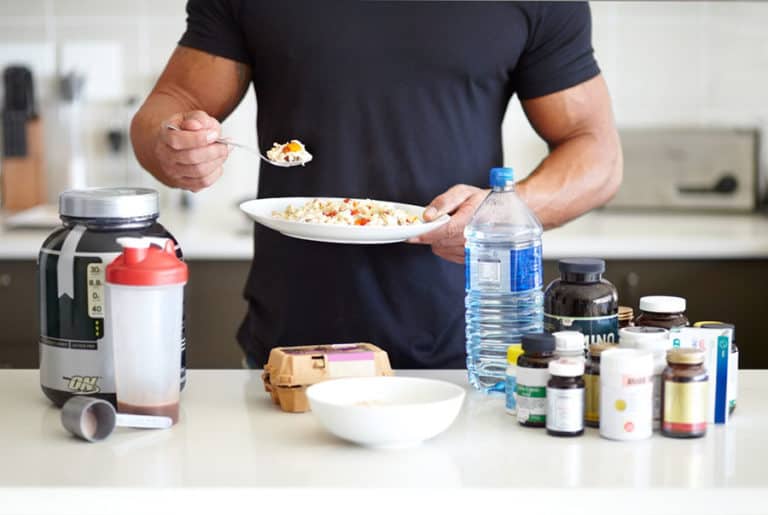Pre-Marathon Nutrition: What to Eat Before a Marathon

Marathons have witnessed a boom in recent decades. However, very few people know about diet, nutrition, and what and how to eat before a marathon.
Running marathons has been a favorite physical activity of several Americans. Although participation in marathons has increased over the past few decades, lack of knowledge regarding pre-marathon and marathon-day nutrition has always remained a concern. For instance – very few people know what to eat before a marathon.
A study [1]The New England Journal of Medicine: Hyponatremia among Runners in the Boston Marathon found that 13% of the 2002 Boston Marathon finishers suffered from hyponatremia. The condition occurs due to low sodium levels in the body and is triggered by slow race times and excess fluid intake. To save you from such health threats, we have come up with a helpful guide on pre-marathon nutrition. Have a look!
What to eat before a marathon?
There is no strict diet plan for marathons. However, as aforementioned, runners should rely on a diet rich in carbs, moderate in proteins, and low in fat. You need to know the right foods to eat before a marathon, as fueling up on the wrong foods can lead to stomach cramps or other health concerns. Scroll down to discover the best foods to eat before a run, foods to avoid, and samples of pre-run meals and snacks samples.
Foods to eat
- Grains such as oatmeal, quinoa, rice, pasta
- Bread, toast, bun, bagel
- Fruit without skin (banana) and pulp-free fruit juice
- Starchy vegetables like roasted/baked potatoes & sweet potatoes
- Lean meat
- For hydration, drink plenty of fluid and electrolytes (500 to 700 ml)
Foods to avoid
- High-fat foods such as fried foods, processed foods, heavy creams, sauces, etc.
- Dairy products high in fat, such as high-fat yogurt and cheese
- High-fiber foods such as cruciferous vegetables and beans.
Sample diet plan for marathon runners
A runner’s diet plan must be balanced and consists of fruits, vegetables, whole grains, and protein. It’s also wise to eat low-fat foods composed of healthy fats. These fats will be used as fuel when glucose stores are empty during the run. Below is a sample marathon diet plan to run efficiently.
| Type | Foods to eat before a marathon |
| Breakfast | Banana, whole grain toast, and eggs |
| Morning Snack | Dried plums, raisins, dried apricot, peanut butter |
| Lunch | Chicken, roasted veggies, quinoa |
| Pre-Run Snack | Greek yogurt with fruits, granola bar |
| Dinner | Roasted or grilled chicken, steamed brown rice |
| Bedtime Snack | Low-fat milk |
Here are some examples of a pre-marathon breakfast or meals:
- 1/2 cup oatmeal + 1 banana + peanut butter
- 4-5 scrambled egg whites + 1 whole egg + 1 jelly toast + banana
- 1 large bagel with peanut butter, banana
- 1 cup cooked pasta with marinara sauce + 1 lightly buttered bread + 3 ounces of chicken breast
- 1 turkey sandwich + 1 granola bar + 1 banana
Pre-run snacks
For quick fuel, consume some pre-run snacks half to one hour before your run. It helps to normalize blood glucose levels while preventing hunger pangs. Make sure the snack foods you eat before a marathon should be low in calories and high in carbs. Here are some examples of pre-run snacks:
- 1 banana or orange
- 1 sports energy bar
- 1 cup yogurt with fruit
- 3-4 dates
- English muffin with fruit jam
How do pre-marathon meals matter?
Whether you are looking forward to breaking a record or just participating in the ultimate race for health and recreation, marathon fueling is critical for optimal performance. The foods you eat before a marathon will provide the necessary nutrients your body requires to sustain energy levels during the race. Appropriate marathon diets will also play their role in post-marathon recovery. Fueling properly also prevents dehydration, decreases the risks of injuries, and lowers fatigue.
Foods you eat before a marathon also serve other purposes like preventing hunger and maintaining optimal blood glucose levels. Your pre-marathon meals should be high in carbs, low in fat, and moderate in protein. You also need to focus on your hydration. Before your race, you need to drink about 500–590 ml of water [2]PubMed: American College of Sports Medicine Joint Position Statement. Nutrition and Athletic Performance to keep your body hydrated.
Keep reading to know the right nutrition for marathons.
Nutrition considerations for marathons
Just like an average individual, marathon runners need to stick to a diet consisting of all the essential nutrients. They can’t perform at their best without adequate nutrition during the run. The recommended [3]Syracuse University: MARATHON RUNNERS AND THEIR NUTRITION VIEWS,
PRACTICES, AND SOURCES OF NUTRI TICES, AND SOURCES OF NUTRITION INFORM TION INFORMATION macronutrient requirement for athletes is quite similar to that of the average individual. Runners should rely on 45%-65% of carbohydrates for daily energy, protein should be 1.2-1.4 g/kg body weight, and fat should account for 20-35% of daily energy.
Carbohydrates
Carbohydrates in the form of blood glucose and muscle glycogen are the primary source of fuel for the body. Hence, the foods you eat before a marathon should be high in carbs. The carbohydrate loading before the marathon will help boost performance, reduce fatigue, and enhance recovery.
Proteins
Marathon runners need more protein than an average individual to perform better as well as for muscle recovery. As per sports nutrition guidelines, the recommended dose of protein for endurance athletes, including marathon runners, is 1.2-1.4 g/kg body weight. One can achieve the recommended allowance with lean protein, protein bars, nuts, seeds, and supplements.
Fats
Fat is a source of energy utilized if you exercise for prolonged periods of time. As a runner, you don’t have to eat high-fat foods but consume them in moderation. Also, you need to stick to foods composed of polyunsaturated fats rather than those having trans fats.
Hydration & electrolytes
Hydration and electrolytes are critical elements of marathon nutrition. Runners and athletes should drink up enough water and energy drinks to replace electrolytes and fluid lost during sweating.
Vitamins and minerals
Just like average individuals, marathon runners need vitamins and minerals, including vitamins A, B, C, D, and E, along with calcium, sodium, phosphorus, iron, ferritin, biotin, and so on.
Understanding the physical impacts of a marathon
Whether you are a beginner or an elite runner, participating in races will challenge your physiological systems. During a marathon, your body goes through specific changes to meet the physical demands of running several miles. Following are the changes that happen to the body at various stages of a marathon:
At the starting line
When you stand at the starting line on race day, the level of the stress hormone adrenaline will rise due to nervousness or excitement. This will cause your heart to beat faster. Your lungs will also breathe at twice or thrice the normal rate. As the marathon begins, your physical systems, including cardiovascular, digestive, endocrine, etc., will go into overdrive. At this point, your heart will have to work harder to pump more blood to distribute to various organs.
During the marathon
On race day, you need to focus on your hydration. During a race, your body produces enormous heat. As a result, the body temperature can increase manifold. To cool your body, the heart sends more blood to the skin and eventually the sweat glands. The sweat glands then produce moisture that evaporates and cools off your body.
It is also important to note that the human body loses 3-6 liters of sweat while performing in a marathon. Hydration becomes indispensable. Lack of adequate hydration can lead to dehydration.
During a marathon, you will also have to take thousands of steps. These steps can put stress on your joint muscles. Eventually, this causes soreness in the thighs, calves, and even shoulders and forearms.
Hitting the wall
A participant loses nearly all the glycogen stores in his or her body on the race day. At this point, their body starts relying on fat for fuel. Since fat offers less energy than glucose, the runner will automatically slow down and can reach the ‘runner’s wall.’ Therefore, it is advisable to keep consuming glucose, a carbohydrate-rich snack, or a sports drink to optimize glycogen stores.
Finishing line
Once you complete the marathon, your immunity can decrease. Your body becomes susceptible to colds and infections. Your cardiovascular system may also be compromised for some time. Further, kidney function can also be reduced for up to 2 weeks.
Conclusion
Nutrition is an essential element of marathon running. The right foods you eat before a marathon will lead to enhanced performance and speed up your post-run recovery. Before running several miles, you need to stick to a healthy marathon diet or meals and continue eating them until the big day arrives. The key lies in consuming foods high in carbs, moderate in protein, and low in fiber and fat.
References
| ↑1 | The New England Journal of Medicine: Hyponatremia among Runners in the Boston Marathon |
|---|---|
| ↑2 | PubMed: American College of Sports Medicine Joint Position Statement. Nutrition and Athletic Performance |
| ↑3 | Syracuse University: MARATHON RUNNERS AND THEIR NUTRITION VIEWS, PRACTICES, AND SOURCES OF NUTRI TICES, AND SOURCES OF NUTRITION INFORM TION INFORMATION |


